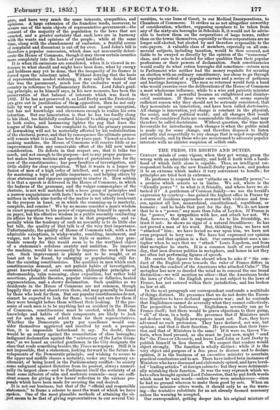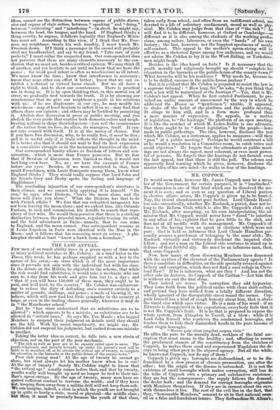THE PRESS, ITS RIGHTS AND DUTIES. CERTAIN minds of some
vigour, when they get wrong, grasp wrong with an admirable tenacity, and hold it forth with a hardi- hood of which faith alone is capable. Thus, an intelligent cor- respondent holds up the new Russell-Derby press-law, and pushes it to an extreme which makes it very convenient to handle ; for principles are tried best in extremes.
He professes to respond to our "attacks on a friendly power,"— a premiss which arrests us in limine. We ask, where is the "friendly power " ? to what is it friendly, and where have we at- tacked it ? A gentleman of Corsican family—we use the herald's expression by courtesy—has gained the highest office in France by i
a course of insidious approaches crowned with violence and trea- son, against all law, monarchical, constitutional, republican' or humane ; and he holds that post for the day. We do not know that he is a " power," any more than John of Leyden. If France is the " power, we sympathize with her, and attack her not. We find, however, that she is impotent. As to his friendship, we trust it not he shows no signs of a natural friendliness ; he has not proved a man of his word. But, thinking thus, we have not " attacked " him we have levied no war upon him, we have not even proposed to; levy war. We have but expressed our opinion of him ; and that opinion is a fact. Our correspondent uses a me- taphor when he says that we " attack" Louis Napoleon, and from that metaphor he starts. It is a common fault of our practical day, that men discuss politics in metaphors, and hence in act they are often but performing figures of speech. He carries the figure to the absurd when he asks if " the con- duct of the English press towards the ruler of France differs in kind from the conduct of the Americans who attacked Cuba ?" The metaphor has now so dazzled the mind as to conceal the one broad distinction—we will mention no other—that the Americans broke the laws of Cuba : the English press is not subject to the laws of France, has not entered within their jurisdiction, and has broken no law at all.
In the next paragraph our correspondent confounds a multitude of things distinct. He presumes that we do not desire the Execu- tive Ministers to have declaredssive war; and he contends
that Englishmen cannot do severally they cannot collectively. The proposition is ludicrous. Englishmen severally can go to France itself; but there would be grave objections to their going, " all" of them, in a body. He presumes that if Ministers must not declare war, English newspapers must not. Now, they have advanced no such pretension. They have declared, not war, but opinion ; and that is their function. He presumes that their func- tion and that of Ministers is the same ! If it were so, Queen Vic- toria, when hard pressed, as she must be just now, might " send for" the Times or Chronicle, and leave Lord John or Lord Derby to publish himself in lieu thereof. We suspect that readers would object strongly. The function is wholly distinct while it is the very object and purpose of a free press to discuss and to declare opinion, it is the business of an executive ministry to ascertain practical conclusions and to act. There have indeed been instances of Ministers who have discussed and elaborately opined, and have level- led " leading articles " at foreign cabinets : but they were detriment- ally mistaking their function. It was the very reproach which we have often brought against Lord Palmerston, that he put forth words which must be vain words—unless they were mischievous—since he had no ground whereon to make them good by acts. When an executive minister utters words, it should only be as the warn- in —the tentative substitute for an act already deemed necessary unless the warning be accepted.
Our correspondent, getting deeper into his original mixture of
ideas, cannot see the distinction between organs of public discus- sion and organs of state action, between " speaking " and "doing," between " criticizing " and "interfering "—in short, he might say, between the head, the tongue, and the hand. If England thinks a thing overtly, he argues, it follows logically that England's Minis- ters must act. According to this view, if I think that Mr. Free- man, my neighbour, treats his wife harshly, I must knock Mr. Freeman down. If I think a passenger in the crowd will probably steal my handkerchief, and say to my friend, " Take care of your pockets," I must collar the suspected man. Our correspondent does not perceive that there are many elements necessary to the con- clusion that we must act, besides a critical opinion. We may think ill of another, and yet hesitate to act until we know that we have the power ; for weak good intent is often as mischievous as ili intent. We must know the time ; know that interference is necessary; know that none other can effect it better; know that we can es- tablish a technical or virtual locus standi. But we all have a right to think, and to show our countenance. There is practical use in doing so. It is by open thinking that, in this mortal sea of error, we gradually tack towards the truth. It is by showing our countenance that we give our neighbour a guide in his relations with us : if he see displeasure in our eye, he may modify his wickedness—may at least hesitate to inflict it on us—may find that others share our opinion ; and others may be fortified by perceiving it. Abolish free discussion in press or public meeting, and you abolish the very guide that enables both domestic rulers and neigh- bouring nations to shape theirbehaviour—you veil the countenance of the nation from its foes, its allies, its managers, itself. It can- not take council with itself. It is at the mercy of chance. But if you have free discussion, why, to be really free, it must be free ; and it is useful only if it truly reflects the thought in the mind. It is better also that it should not wait to find its first expression in a convulsive struggle or in the metacarpal knuckles of the fist.
Our correspondent kindly allows us freedom of letters and con- versation,—which is more than France possesses. But we fear that if freedom of discussion were limited to that, it would not last long even here. No, no ; we have the example of France before our eyes. Besides, if we were restricted to that, how could Frenchmen, with Louis Bonaparte among them, know what England thinks ? They would really suppose that Lord John and his friends Grey and Derby spoke the feeling and language of Englishmen !
The concluding injunction of our correspondent's strictures is their climax, and we cannot help applying it to himself. "Do you," he says, after Dickens, "leave the moon alone, and the moon will leave you alone." What the Dickens has that to do with French affairs ? We fear that our redoubted antagonist has not been leaving the moon alone ; and we exhort him, like Orlando Furioso, to seek and commission his Astolfo to search that repo- sitory of lost wits. He would then perceive that there is a striking distinction between the peaceful moon, regularly tracing its orbit, and the bold adventurer in Paris—namely, that he can come to England, and the moon cannot. Our correspondent reasons as if Louis Napoleon in Paris were identical with the Man in the Moon; and it follows that his reasoning must go astray. A phi- losopher should at least "know a hawk from a hernshaw."



























 Previous page
Previous page